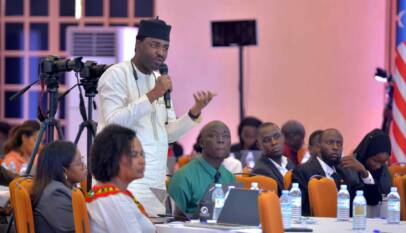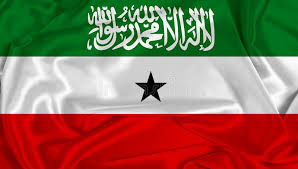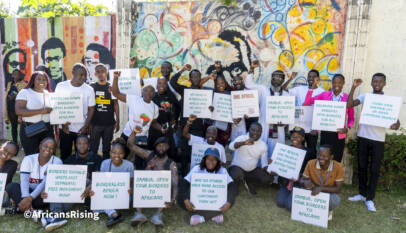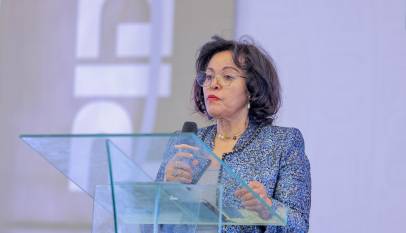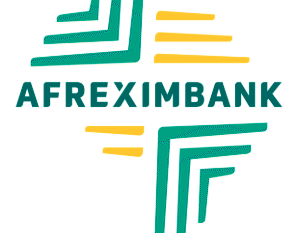SPOTLIGHT | Gaya Gamhewage: The Journalist-Turned-Doctor Transforming Global Health Communication
The World Health Organization’s (WHO) new Director of Communications, Dr. Gaya Gamhewage, brings a bold Global South perspective to global health communication — championing trust, empathy, and community-driven engagement as the true foundations of public health.

From reporting against the backdrop of Sri Lanka’s civil war to responding on the frontlines of global epidemics and pandemics, Dr. Gaya Gamhewage — the newly appointed Director of Communications at the World Health Organization (WHO) — has witnessed the full spectrum of human vulnerability, courage, and resilience.
Now stepping into one of global health’s most strategic communication roles, she is determined to usher in a new era of trust-based, people-centred public health communication — one that elevates Global South voices and reshapes how the world understands and engages with public health.
Born in Sri Lanka, Dr. Gamhewage began her professional journey as a newspaper reporter — a passion that would later shape her approach to medicine, public health governance, and community engagement.
Today, with nearly four decades of combined experience in journalism and public health — including more than twenty-four years at WHO — Gaya stands among the few global health leaders who have travelled the full arc of public health practice: from rural clinics and community engagement during conflict, to the highest levels of global health leadership in Geneva.
Though Sri Lankan by birth, Dr. Gamhewage speaks of Africa with the ease and depth of someone who has lived its realities and contributed to shaping its global health narrative. For her, the continent’s health story is not one of deficit, but one of resilience, innovation, and leadership. “Africa doesn’t need a new story — it needs the world to finally listen to the story it’s already telling,” she says with quiet conviction.
Her communication vision for WHO is firmly anchored in Global South perspectives. Gaya insists that narratives about Africa must begin from a place of dignity, ownership, and local expertise. Under her leadership, WHO’s communications across the continent will elevate stories of African-led solutions — spotlighting the scientists, frontline health workers, innovators, and community leaders who are building a healthier, more self-reliant Africa.
From Journalism to Global Health
Dr. Gamhewage’s path from journalism to global health unfolded against the backdrop of Sri Lanka’s civil war — a period that would fundamentally shape her approach to public service. Leaving clinical practice, she joined Sarvodaya, Sri Lanka’s largest and most broadly embedded non-governmental community development organization.
As Director of Community Health, she coordinated lifesaving interventions in conflict-affected communities and learned a principle that would define her career: “Communities are not beneficiaries — they are partners in their own wellbeing,” she told African Newspage.
Since joining the WHO in 2001, Gaya has played a pivotal role in shaping global health reforms. Among other achievements, she helped establish the WHO Health Emergencies Programme, led the development of its risk communication and community engagement frameworks, and spearheaded the organization’s global learning systems during the COVID-19 pandemic — one of the largest learning and workforce mobilization efforts in the WHO’s history.
Dr Gamhewage’s career trajectory also includes serving as WHO’s first Director for the Prevention and Response to Sexual Misconduct by aid workers — a groundbreaking mandate that underscored her belief that trust and accountability are the bedrock of credible institutions.
Now, as WHO’s Director of Communications — and notably, the first person from outside the Global North to hold this position — she brings an inclusive, deeply grounded Global South perspective to the heart of the organization’s communications work. Her conviction, shaped through decades of service across Sri Lanka, China, England, and Switzerland, is unmistakable: communication is not an accessory to health policy — it is its core operating system.
“Public Health Has Been My North Star”
Reflecting on her journey, Dr. Gamhewage says her multidisciplinary background — spanning journalism, medicine, and humanitarian response — has profoundly shaped how she understands health communication in complex, multicultural contexts.
“I had a short career in journalism and even went to law college, though I didn’t finish before moving into medical school and public health. I’ve now been with WHO for twenty-four years. What brought me here was my unwavering dedication to public health. In every role I’ve played, public health has been my guiding principle — my North Star,” she told African Newspage.
For Gaya, effective communication must always begin with people’s lived realities. “Public health plays out in many different ways,” she explains. “But the core never changes — it is about everyone’s right to achieve the highest attainable level of health and to have access to the information they need to take charge of their own destiny.”
A Global South Perspective
Dr. Gamhewage’s appointment marks a significant turning point for WHO. As the first Communications Director from outside the Global North, she views her role as both deeply personal and profoundly symbolic.
“Instead of worrying about what I don’t have, I focus on what I bring — the richness of being a doctor, a woman, a mother, and someone who has worked on the frontlines. It’s an opportunity to do things differently,” she says.
Her lived experience has also shaped how she understands gender and leadership in global health. “I want to focus not only on policy makers, but on women — women deliver health in homes, and women health workers deliver health in our systems. My experience as a woman who has been a mother, been sick, and lived through war gives me an added perspective.”
For Gaya, her new role is more than a professional milestone — it is a call to the Global South to reclaim its voice and agency in global health governance. “I see myself as a public health person deeply motivated by the idea of health for all. The health of people in Africa, Asia, the Middle East, Europe and the Americas matters equally. Our public health communications must be relevant to everyone, regardless of where they live. Unless we all participate in shaping public health, we won’t achieve access to health for all.”
Trust as the New Currency of Health
For Dr. Gamhewage, trust is the most valuable currency in public health. Having worked extensively in conflict and post-conflict zones, she has seen firsthand that credibility — not technology, funding, or even medical expertise — often determines the success or failure of an intervention.
“Trust is the currency that all public officials and public institutions deal with. If you’re not trusted, nobody will listen to all the great ideas you have. Everything we do either adds to or takes away from the trust people have in us.”
Her vision for WHO communication begins not with messaging, but with empathy — a principle shaped by decades on the ground. “We have to understand the lived realities of people when we give public health advice. If a mother can’t get her child vaccinated because there’s no transport or her husband forbids it, we must understand that before we prescribe solutions. That is what I’m trying to instill in our community and in the new strategy we’re developing.”
This ethos represents a shift away from top-down communication toward a model that is participatory, community-driven, and rooted in dignity. For Gaya, it is not enough to disseminate information; communities must be empowered to shape the solutions that affect their lives.
“People have agency. We must stop telling people what to do and instead co-create health solutions with them. This is how we eradicated smallpox, addressed measles, and tackled HIV/AIDS.”
Learning from Africa’s Crises
Dr. Gamhewage’s fieldwork across nearly 70 countries — many of them in Africa — has profoundly shaped WHO’s modern approach to crisis response. One of the defining chapters of her career was her deployment to West Africa during the 2014–2016 Ebola outbreak, an experience she describes as a global wake-up call.
“It was a big lesson for the world. Some of the most powerful countries sent their best emergency medical and military teams, but it took years to bring it under control — because we were using the wrong engagement models. We weren’t taking community engagement seriously.”
That realization, she says, changed everything. The turning point came when responders began working with communities rather than around them — listening to local leaders, adapting interventions to cultural realities, and empowering households with the information and tools they needed to protect themselves.
“After the West Africa Ebola crisis, community engagement became a pillar of outbreak response, as important as clinical care and surveillance. Only when we see the situation holistically can we bring an outbreak under control.”
This shift, now embedded in WHO’s emergency operations worldwide, has its roots in the resilience, insight, and leadership of African communities themselves — a model Dr. Gamhewage believes will shape the future of global health preparedness.
Youth at Health’s Heart
With over 60% of Africa’s population under 25, Dr. Gamhewage emphasizes that young people must be central to health communication on the continent.
“Everyone has told me to focus on youth,” she says, “but to do that effectively, we must listen to them and build coalitions that speak with them. Communication should be a dialogue, not just messaging.”
Dr Gamhewage’s forthcoming WHO communication strategy will prioritize participatory, tech-driven engagement with youth and digital influencers.
“We need coalitions of young people, media, and trusted partners. Health promotion, protection, and behavior change begin with youth. Listening, co-creating, and empowering young Africans is how we will succeed.”
Redefining Leadership in Global Health
For Dr. Gamhewage, leadership is not about hierarchy—it is about humility, inclusion, and shared ownership. “Leadership means creating space for others to contribute, innovate, and be heard. My goal is to co-create solutions, empower communities, and support countries in making their own decisions.”
Her message to the Global South emphasizes participation and agency: “The era of dependency must give way to one of self-determination. The Global South must step up, take charge, and chart our path toward health for all.”
From news reporting to shaping WHO’s global communications, Dr. Gamhewage’s journey is one of purpose and persistence—a testament that the Global South can lead not only in population, but in vision. “I come from a post-colonial nation. I believe that we have the right and the duty to stand on our own two feet. Health is critical to all nations, and investing in it is non-negotiable. Countries must own their health agenda.”
Looking ahead, Dr. Gamhewage envisions a WHO that listens more than it speaks—one that builds trust through empathy, empowers youth, and bridges the North-South divide. Her appointment, she hopes, coincides with the shift towards a more inclusive, participatory era in global health—where leadership is measured not by power, but by the number of lives uplifted.


